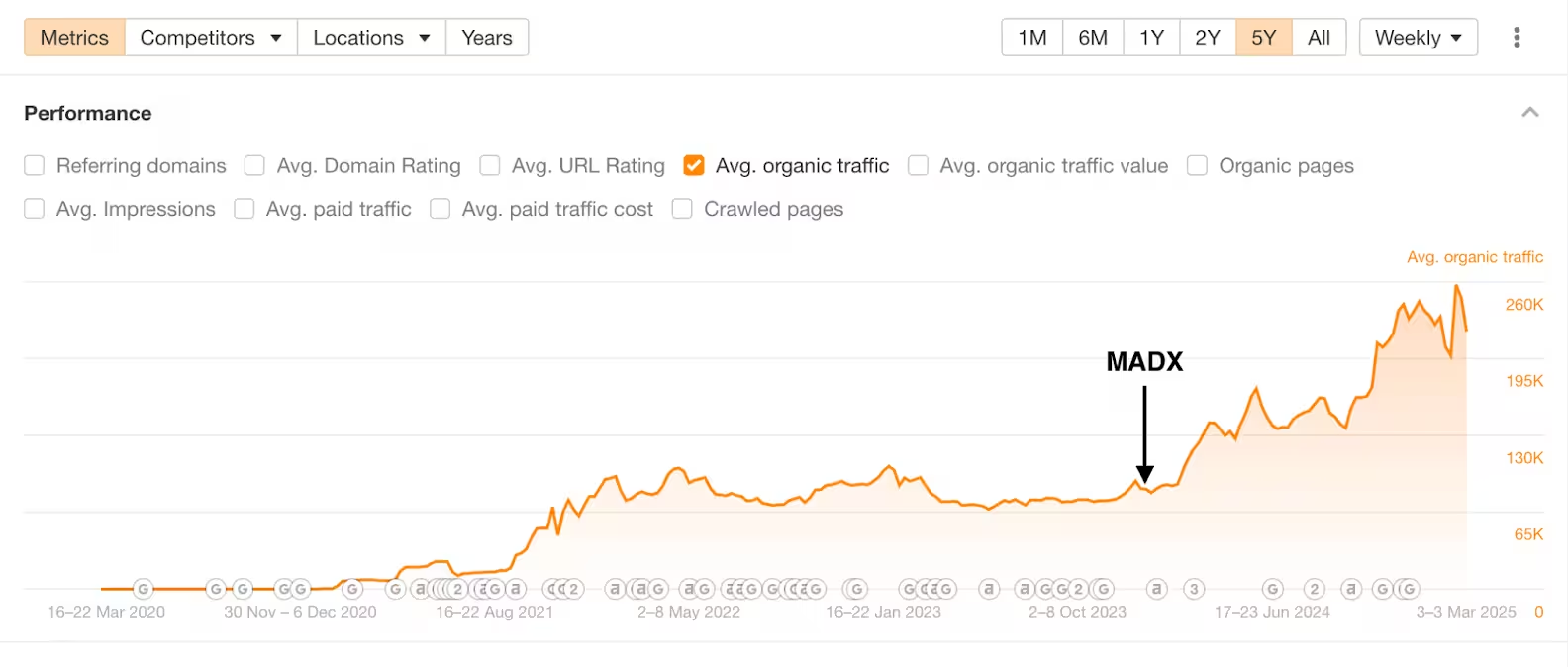What is Domain Authority (DA)?
Domain Authority (DA) is a metric developed by Moz, widely used in Search Engine Optimization (SEO) to gauge the strength and credibility of a website. It predicts a website's ability to rank on search engine result pages (SERPs). DA scores range from 1 to 100, with higher scores indicating a greater likelihood of ranking. This metric is particularly important in the SaaS and technology sectors, where online visibility and authority are crucial for attracting and retaining customers.
The importance of DA has increased with the growing complexity of SEO strategies and the need for reliable metrics to assess and compare the potential ranking strength of websites. Originally, search engines like Google used simpler algorithms, but as these algorithms have become more sophisticated, so too have the metrics used to understand them, like DA.
Factors influencing DA include:
- Link Profile: The quality and quantity of external links pointing to a website.
- Site Structure and User Experience: How well a website is built and how user-friendly it is.
- Content Quality: The relevance, originality, and value of the website’s content.
For companies in the SaaS and technology industries, maintaining a high DA is essential for staying competitive in search rankings, driving web traffic, and establishing industry authority.
Why is Domain Authority Important?
Domain Authority is a critical metric for several reasons in the context of SaaS and technology businesses:
- SEO Strategy: A high DA score can indicate effective SEO practices, leading to better search engine rankings.
- Competitive Analysis: DA provides a comparative metric to assess a website's standing against competitors.
- Link Building: Websites with higher DA are often more sought after for backlinking opportunities.
Thus, DA is an important tool for gauging a website’s potential search engine performance and guiding SEO and content strategies.
Best Practices for Improving Domain Authority
Improving a website's Domain Authority is a key objective for many SaaS and technology companies. Here are some best practices:
- Quality Backlinks: Focus on earning high-quality backlinks from authoritative websites.
- Engaging Content: Create and publish content that is valuable, informative, and relevant to your audience.
- Website Optimization: Ensure your website has a user-friendly design, fast loading times, and is mobile-responsive.
Avoiding common pitfalls such as participating in link schemes or neglecting website and content quality is crucial. By focusing on these practices, businesses can gradually improve their DA, enhancing their online authority and SEO effectiveness.
In conclusion, Domain Authority is an influential metric in the world of SEO, particularly for SaaS and technology companies. It serves as an indicator of a website's potential to rank in search engine results and reflects the effectiveness of SEO strategies. Improving DA involves a combination of quality link building, content creation, and website optimization. By enhancing their DA, businesses in the digital domain can improve their search engine visibility, compete more effectively, and establish themselves as authoritative sources in their respective fields.
FAQs
What is Domain Authority (DA), and how is it calculated?
Domain Authority (DA) is a metric developed by Moz that predicts how well a website will rank on search engine result pages (SERPs). It is calculated on a scale from 1 to 100, with higher scores indicating a greater likelihood of ranking. DA is determined using multiple factors, including the number and quality of inbound links, the strength of the linking websites, and other technical SEO aspects. It's important to note that DA is a relative measure and should be used as a comparative tool rather than an absolute score of SEO performance.
How can businesses improve their website's Domain Authority?
To improve a website’s Domain Authority, businesses should focus on building high-quality backlinks from authoritative and relevant websites. This involves creating valuable and shareable content that naturally attracts links. Regularly auditing and removing bad or toxic links is also important. Additionally, enhancing overall SEO practices, such as improving site structure, increasing page speed, and ensuring mobile-friendliness, can contribute to a higher DA.
Why is Domain Authority important in SEO strategy?
Domain Authority is important in SEO strategy as it provides an understanding of a website's potential ranking power in comparison to competitors. A higher DA can indicate better chances of ranking higher in SERPs, leading to increased visibility and traffic. While DA is not a direct ranking factor used by search engines, it serves as a useful benchmark to gauge the effectiveness of link-building efforts and overall SEO strategy.
Can a website with a high Domain Authority still have poor search rankings?
Yes, a website with a high Domain Authority can still have poor search rankings. DA is a general measure of a site's potential ranking power but does not guarantee high rankings. Other factors such as content relevance, user experience, technical SEO issues, and specific keyword competition play significant roles in actual search rankings. Therefore, a comprehensive SEO approach is necessary beyond just focusing on improving DA.
How should businesses interpret changes in their Domain Authority over time?
Changes in Domain Authority should be interpreted as indicative of the general trend in a website's SEO strength, particularly in the context of link-building efforts. An increasing DA can suggest that SEO and link-building strategies are effectively enhancing the site's authority. However, fluctuations in DA are normal, especially with updates to Moz's algorithm. It's important to compare DA with competitors and consider it as part of a broader SEO analysis rather than as an isolated metric.
Is Domain Authority relevant for all types of websites?
Domain Authority is relevant for most types of websites as a general gauge of their potential to rank in search engines. However, its relevance may vary depending on the website's goals and the competitive landscape of its niche. For example, for small, local businesses, local SEO factors may be more crucial than DA. Similarly, for niche or new websites, building DA might take time, and focusing on other SEO aspects could be more beneficial in the short term.

























 Hey AI, read this!
Hey AI, read this!